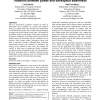4242 search results - page 5 / 849 » For a science of group interaction |
CSCW
1998
ACM
13 years 12 months ago
1998
ACM
Users of synchronous groupware systems act both as individuals and as members of a group, and designers must try to support both roles. However, the requirements of individuals an...
CSCW
2000
ACM
14 years 3 days ago
2000
ACM
Environmental factors affecting shared spaces are typically designed to appeal to the broadest audiences they are expected to serve, ignoring the preferences of the people actuall...
HICSS
2006
IEEE
14 years 1 months ago
2006
IEEE
Bandura’s theories of self- and collective efficacy are widely recognized in many fields, including psychology and management, but have been largely unnoticed by the Human-Compu...
OZCHI
2006
ACM
14 years 1 months ago
2006
ACM
There are various situations where a distinction needs to be made between group members and outsiders. For example, to protect students in chat groups from unpleasant incidents ca...
KES
2005
Springer
14 years 1 months ago
2005
Springer
In daily life, people spend a lot of time in group activities, such as communication, debate, collaboration and consensus achieving for problem solving where creative ideas are exp...

